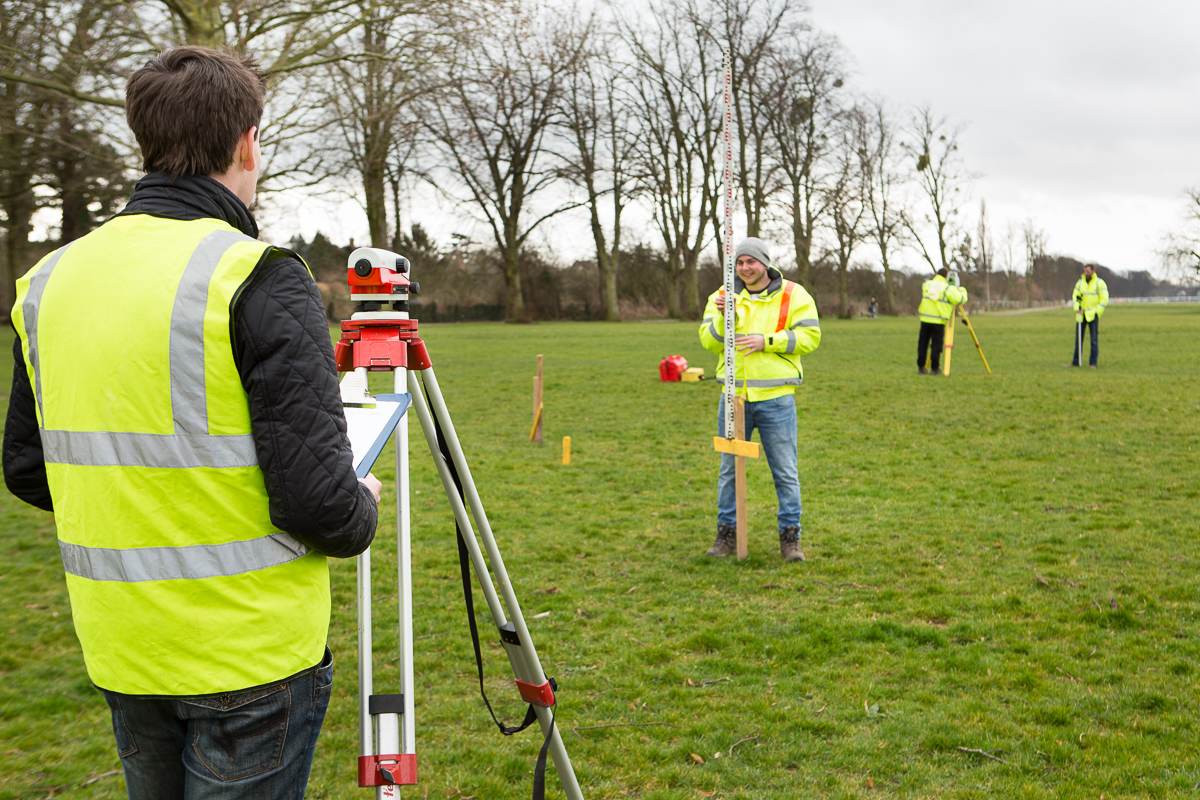Published: 29 May 2024
There are always discussions in the media about a skills gap in so many sectors. The construction and engineering sectors as a whole are experiencing this and the surveying profession is too. Two of the barriers to this are knowledge and awareness – knowledge of surveying as a career and awareness of the opportunities available. In light of this, we are endeavouring to raise awareness of surveying as a prospective career via a range of opportunities. At The Survey School, there is a range of courses, wide in scope and ability, that can be either a starting point or a consolidation of already-acquired skills.
Route one into land surveying
One of the routes into surveying is as a Trainee Land Surveyor. The role is one that combines practical work and assessment. A trainee will support the survey team – which could range from one surveyor to any number of surveyors or site survey technicians – in general surveying tasks. This will take place both in the field – i.e. on site or in the public domain – and in office environments. For this role, flexibility and the willingness to travel are essential requirements, as is the ability to learn a multitude of skills. It is expected that the Trainee Surveyor will have ‘on the job training’ in relation to all areas of site operations and this may include attending TSA Surveying Course run at The Survey School in Worcester.
This path has been primarily created for the development of new entrants into the geomatics industry, or those with experience but no formal training or professional qualifications. Those with more experience can become an Assistant Surveyor – candidates here will ideally have two years’ relevant surveying experience. Knowledge of basic surveying principles and a clean driving licence are also assets. It is expected that the Assistant Surveyor will undertake ‘on the job training’ in relation to all areas of site operations. Like a Trainee Surveyor, an Assistant Land Surveyor will support the survey team both in the field and back at the office.
Core skills for land surveying
Another route for young people is through T Levels. These are for students in full-time education in Years 12 and 13 – following on from GCSEs and in lieu of A Levels. Many sixth forms and Further Education colleges offer a T Level Technical Qualification in Design, Surveying and Planning, with land survey skills being a key element of the curriculum.
The qualification has been designed as an alternative to academic study – one T Level is the equivalent to three A levels. The qualification places emphasis on practical learning. Successful graduates will need a minimum of 315 hours of work experience with an employer, as well as classroom theory qualifications. T Levels offer a viable option for those wishing to pursue a career in surveying at an early stage in their education and provides a solid foundation in core construction, methodology and planning skills.
Apprenticeships are another route into becoming a surveyor, with the advantage of students earning while they are learning on site and in the office as part of a business. The practicalities and intricacies of the profession are perhaps better explained in a practical environment. Working with technicians who already possess knowledge and qualifications will work well for receptive, instinctive learners. Another avenue to engage with young people is via local scout groups. TSA’s Scouts Initiative is growing into a programme that can be easily adapted and rolled out to any group of young people. This can also involve outreach to local schools, where students can be made aware of career options in the surveying profession. There’s also the opportunity for anyone keen to dip their toe into the sector by undertaking work experience placements – this is a good way of getting a flavour of what the profession and career path entails.
Beyond these options, there are college courses, degrees and further qualifications that can be achieved further down the road, by both individuals and companies. The destination is always a successful career in surveying, but it’s worth remembering that there are many routes that can get you there.
If you would like more information about the opportunities available to students regarding careers in surveying, then contact us today.

